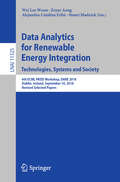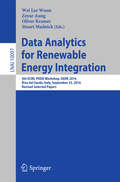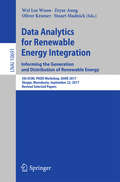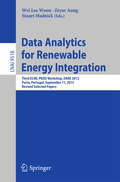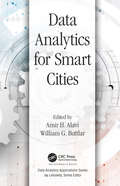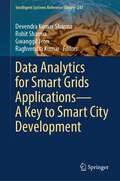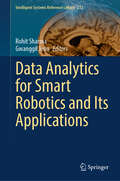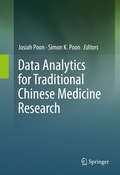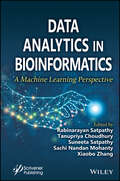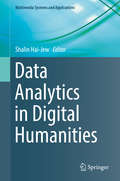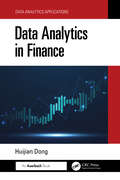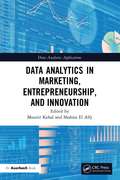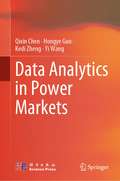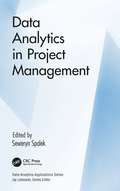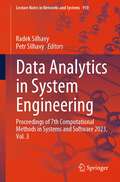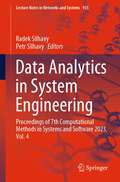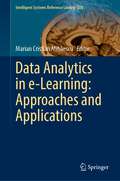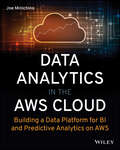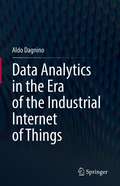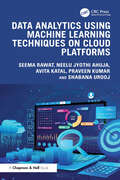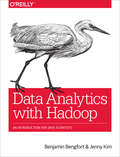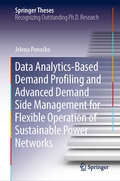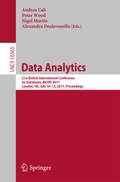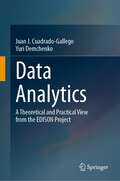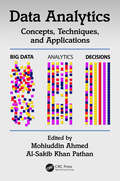- Table View
- List View
Data Analytics for Renewable Energy Integration. Technologies, Systems and Society: 6th ECML PKDD Workshop, DARE 2018, Dublin, Ireland, September 10, 2018, Revised Selected Papers (Lecture Notes in Computer Science #11325)
by Wei Lee Woon Zeyar Aung Stuart Madnick Alejandro Catalina FeliúThis book constitutes the revised selected papers from the 6th ECML PKDD Workshop on Data Analytics for Renewable Energy Integration, DARE 2018, held in Dublin, Ireland, in September 2018. The 9 papers presented in this volume were carefully reviewed and selected for inclusion in this book and handle topics such as time series forecasting, the detection of faults, cyber security, smart grid and smart cities, technology integration, demand response, and many others.
Data Analytics for Renewable Energy Integration: 4th ECML PKDD Workshop, DARE 2016, Riva del Garda, Italy, September 23, 2016, Revised Selected Papers (Lecture Notes in Computer Science #10097)
by Oliver Kramer Wei Lee Woon Zeyar Aung Stuart MadnickThis book constitutes revised selected papers from the second ECML PKDD Workshop on Data Analytics for Renewable Energy Integration, DARE 2014, held in Nancy, France, in September 2014. The 11 papers presented in this volume were carefully reviewed and selected for inclusion in this book.
Data Analytics for Renewable Energy Integration: 5th ECML PKDD Workshop, DARE 2017, Skopje, Macedonia, September 22, 2017, Revised Selected Papers (Lecture Notes in Computer Science #10691)
by Wei Lee Woon, Zeyar Aung, Oliver Kramer and Stuart MadnickThis book constitutes revised selected papers from the 5th ECML PKDD Workshop on Data Analytics for Renewable Energy Integration, DARE 2017, held in Skopje, Macedonia, in September 2017. The 11 papers presented in this volume were carefully reviewed and selected for inclusion in this book and handle topics such as time series forecasting, the detection of faults, cyber security, smart grid and smart cities, technology integration, demand response and many others.
Data Analytics for Renewable Energy Integration: Third ECML PKDD Workshop, DARE 2015, Porto, Portugal, September 11, 2015. Revised Selected Papers (Lecture Notes in Computer Science #9518)
by Wei Lee Woon Zeyar Aung Stuart MadnickThis book constitutes revised selected papers from the second ECML PKDD Workshop on Data Analytics for Renewable Energy Integration, DARE 2014, held in Nancy, France, in September 2014. The 11 papers presented in this volume were carefully reviewed and selected for inclusion in this book.
Data Analytics for Smart Cities (Data Analytics Applications)
by William G. Buttlar Amir AlaviThe development of smart cities is one of the most important challenges over the next few decades. Governments and companies are leveraging billions of dollars in public and private funds for smart cities. Next generation smart cities are heavily dependent on distributed smart sensing systems and devices to monitor the urban infrastructure. The smart sensor networks serve as autonomous intelligent nodes to measure a variety of physical or environmental parameters. They should react in time, establish automated control, and collect information for intelligent decision-making. In this context, one of the major tasks is to develop advanced frameworks for the interpretation of the huge amount of information provided by the emerging testing and monitoring systems. Data Analytics for Smart Cities brings together some of the most exciting new developments in the area of integrating advanced data analytics systems into smart cities along with complementary technological paradigms such as cloud computing and Internet of Things (IoT). The book serves as a reference for researchers and engineers in domains of advanced computation, optimization, and data mining for smart civil infrastructure condition assessment, dynamic visualization, intelligent transportation systems (ITS), cyber-physical systems, and smart construction technologies. The chapters are presented in a hands-on manner to facilitate researchers in tackling applications. Arguably, data analytics technologies play a key role in tackling the challenge of creating smart cities. Data analytics applications involve collecting, integrating, and preparing time- and space-dependent data produced by sensors, complex engineered systems, and physical assets, followed by developing and testing analytical models to verify the accuracy of results. This book covers this multidisciplinary field and examines multiple paradigms such as machine learning, pattern recognition, statistics, intelligent databases, knowledge acquisition, data visualization, high performance computing, and expert systems. The book explores new territory by discussing the cutting-edge concept of Big Data analytics for interpreting massive amounts of data in smart city applications.
Data Analytics for Smart Grids Applications—A Key to Smart City Development (Intelligent Systems Reference Library #247)
by Rohit Sharma Raghvendra Kumar Devendra Kumar Sharma Gwanggil JeonThis book introduces big data analytics and corresponding applications in smart grids. The characterizations of big data, smart grids as well as a huge amount of data collection are first discussed as a prelude to illustrating the motivation and potential advantages of implementing advanced data analytics in smart grids. Basic concepts and the procedures of typical data analytics for general problems are also discussed. The advanced applications of different data analytics in smart grids are addressed as the main part of this book. By dealing with a huge amount of data from electricity networks, meteorological information system, geographical information system, etc., many benefits can be brought to the existing power system and improve customer service as well as social welfare in the era of big data. However, to advance the applications of big data analytics in real smart grids, many issues such as techniques, awareness, and synergies have to be overcome. This book provides deployment of semantic technologies in data analysis along with the latest applications across the field such as smart grids.
Data Analytics for Smart Robotics and Its Applications (Intelligent Systems Reference Library #272)
by Rohit Sharma Gwanggil JeonBy offering a deep dive into the integration of robotics and IoT, this book provides actionable insights for developing autonomous systems that address complex real-world challenges in sectors such as healthcare, agriculture, education, manufacturing, and smart cities. It explores practical applications of the Internet of Robotic Things (IoRT), enabling readers to leverage its transformative potential to create smarter, more efficient environments. The book introduces a fresh perspective by combining the fields of robotics and IoT into a cohesive framework, underpinned by innovations in edge computing, cloud robotics, and Industry 4.0. Unlike traditional approaches, it emphasizes the convergence of these technologies to foster novel solutions for remote automation and data-driven intelligence. Covering topics like data management, machine learning, Hadoop, and IoRT applications, this book provides a comprehensive scope that balances theoretical foundations with real-world implementations. It is tailored for academic researchers, practitioners, and educators aiming to stay at the forefront of IoRT innovation and its practical deployment. With its unique approach and broad applicability, this book is an essential guide for exploring cutting-edge IoRT technologies, overcoming integration challenges, and inspiring the development of advanced systems that redefine how technology interacts with the physical world.
Data Analytics for Traditional Chinese Medicine Research
by Josiah Poon Simon K. PoonThis contributed volume explores how data mining, machine learning, and similar statistical techniques can analyze the types of problems arising from Traditional Chinese Medicine (TCM) research. The book focuses on the study of clinical data and the analysis of herbal data. Challenges addressed include diagnosis, prescription analysis, ingredient discoveries, network based mechanism deciphering, pattern-activity relationships, and medical informatics. Each author demonstrates how they made use of machine learning, data mining, statistics and other analytic techniques to resolve their research challenges, how successful if these techniques were applied, any insight noted and how these insights define the most appropriate future work to be carried out. Readers are given an opportunity to understand the complexity of diagnosis and treatment decision, the difficulty of modeling of efficacy in terms of herbs, the identification of constituent compounds in an herb, the relationship between these compounds and biological outcome so that evidence-based predictions can be made. Drawing on a wide range of experienced contributors, Data Analytics for Traditional Chinese Medicine Research is a valuable reference for professionals and researchers working in health informatics and data mining. The techniques are also useful for biostatisticians and health practitioners interested in traditional medicine and data analytics.
Data Analytics in Bioinformatics: A Machine Learning Perspective
by Xiaobo Zhang Suneeta Satpathy Sachi Nandan Mohanty Tanupriya Choudhury Rabinarayan SatpathyMachine learning techniques are increasingly being used to address problems in computational biology and bioinformatics. Novel machine learning computational techniques to analyze high throughput data in the form of sequences, gene and protein expressions, pathways, and images are becoming vital for understanding diseases and future drug discovery. Machine learning techniques such as Markov models, support vector machines, neural networks, and graphical models have been successful in analyzing life science data because of their capabilities in handling randomness and uncertainty of data noise and in generalization. Machine Learning in Bioinformatics compiles recent approaches in machine learning methods and their applications in addressing contemporary problems in bioinformatics approximating classification and prediction of disease, feature selection, dimensionality reduction, gene selection and classification of microarray data and many more.
Data Analytics in Digital Humanities (Multimedia Systems and Applications)
by Shalin Hai-JewThis book covers computationally innovative methods and technologies including data collection and elicitation, data processing, data analysis, data visualizations, and data presentation. It explores how digital humanists have harnessed the hypersociality and social technologies, benefited from the open-source sharing not only of data but of code, and made technological capabilities a critical part of humanities work. Chapters are written by researchers from around the world, bringing perspectives from diverse fields and subject areas. The respective authors describe their work, their research, and their learning. Topics include semantic web for cultural heritage valorization, machine learning for parody detection by classification, psychological text analysis, crowdsourcing imagery coding in natural disasters, and creating inheritable digital codebooks. Designed for researchers and academics, this book is suitable for those interested in methodologies and analytics that can be applied in literature, history, philosophy, linguistics, and related disciplines. Professionals such as librarians, archivists, and historians will also find the content informative and instructive.
Data Analytics in Finance (Data Analytics Applications)
by Huijian DongData Analytics in Finance covers the methods and application of data analytics in all major areas of finance, including buy-side investments, sell-side investment banking, corporate finance, consumer finance, financial services, real estate, insurance, and commercial banking. It explains statistical inference of big data, financial modeling, machine learning, database querying, data engineering, data visualization, and risk analysis. Emphasizing financial data analytics practices with a solution- oriented purpose, it is a “one-stop-shop” of all the major data analytics aspects for each major finance area.The book paints a comprehensive picture of the data analytics process including: Statistical inference of big data Financial modeling Machine learning and AI Database querying Data engineering Data visualization Risk analysis Each chapter is crafted to provide complete guidance for many subject areas including investments, fraud detection, and consumption finance. Avoiding data analytics methods widely available elsewhere, the book focuses on providing data analytics methods specifically applied to key areas of finance. Written as a roadmap for researchers, practitioners, and students to master data analytics instruments in finance, the book also provides a collection of indispensable resources for the readers’ reference. Offering the knowledge and tools necessary to thrive in a data-driven financial landscape, this book enables readers to deepen their understanding of investments, develop new approaches to risk management, and apply data analytics to finance.
Data Analytics in Marketing, Entrepreneurship, and Innovation (Data Analytics Applications)
by Mounir Kehal Shahira El AlfyInnovation based in data analytics is a contemporary approach to developing empirically supported advances that encourage entrepreneurial activity inspired by novel marketing inferences. Data Analytics in Marketing, Entrepreneurship, and Innovation covers techniques, processes, models, tools, and practices for creating business opportunities through data analytics. It features case studies that provide realistic examples of applications. This multifaceted examination of data analytics looks at: Business analytics Applying predictive analytics Using discrete choice analysis for decision-making Marketing and customer analytics Developing new products Technopreneurship Disruptive versus incremental innovation The book gives researchers and practitioners insight into how data analytics is used in the areas of innovation, entrepreneurship, and marketing. Innovation analytics helps identify opportunities to develop new products and services, and improve existing methods of product manufacturing and service delivery. Entrepreneurial analytics facilitates the transformation of innovative ideas into strategy and helps entrepreneurs make critical decisions based on data-driven techniques. Marketing analytics is used in collecting, managing, assessing, and analyzing marketing data to predict trends, investigate customer preferences, and launch campaigns.
Data Analytics in Power Markets
by Yi Wang Qixin Chen Hongye Guo Kedi ZhengThis book aims to solve some key problems in the decision and optimization procedure for power market organizers and participants in data-driven approaches. It begins with an overview of the power market data and analyzes on their characteristics and importance for market clearing. Then, the first part of the book discusses the essential problem of bus load forecasting from the perspective of market organizers. The related works include load uncertainty modeling, bus load bad data correction, and monthly load forecasting. The following part of the book answers how much information can be obtained from public data in locational marginal price (LMP)-based markets. It introduces topics such as congestion identification, componential price forecasting, quantifying the impact of forecasting error, and financial transmission right investment. The final part of the book answers how to model the complex market bidding behaviors. Specific works include pattern extraction, aggregated supply curve forecasting, market simulation, and reward function identification in bidding. These methods are especially useful for market organizers to understand the bidding behaviors of market participants and make essential policies. It will benefit and inspire researchers, graduate students, and engineers in the related fields.
Data Analytics in Project Management (Data Analytics Applications)
by Seweryn SpalekThis book aims to help the reader better understand the importance of data analysis in project management. Moreover, it provides guidance by showing tools, methods, techniques and lessons learned on how to better utilize the data gathered from the projects. First and foremost, insight into the bridge between data analytics and project management aids practitioners looking for ways to maximize the practical value of data procured. The book equips organizations with the know-how necessary to adapt to a changing workplace dynamic through key lessons learned from past ventures. The book’s integrated approach to investigating both fields enhances the value of research findings.
Data Analytics in System Engineering: Proceedings of 7th Computational Methods in Systems and Software 2023, Vol. 3 (Lecture Notes in Networks and Systems #910)
by Radek Silhavy Petr SilhavyThese proceedings offer an insightful exploration of integrating data analytics in system engineering. This book highlights the essential role of data in driving innovation, optimizing processes, and solving complex challenges in the field. Targeted at industry professionals, researchers, and enthusiasts, this book serves as a comprehensive resource, providing actionable insights and showcasing transformative applications of data in engineering. It is a must-read for anyone keen on understanding and participating in the ongoing evolution of system engineering in our data-centric world.
Data Analytics in System Engineering: Proceedings of 7th Computational Methods in Systems and Software 2023, Vol. 4 (Lecture Notes in Networks and Systems #935)
by Radek Silhavy Petr SilhavyThese proceedings offer an insightful exploration of integrating data analytics in system engineering. This book highlights the essential role of data in driving innovation, optimizing processes, and solving complex challenges in the field. Targeted at industry professionals, researchers, and enthusiasts, this book serves as a comprehensive resource, providing actionable insights and showcasing transformative applications of data in engineering. It is a must-read for anyone keen on understanding and participating in the ongoing evolution of system engineering in our data-centric world.
Data Analytics in e-Learning: Approaches and Applications (Intelligent Systems Reference Library #220)
by Marian Cristian MihăescuThis book focuses on research and development aspects of building data analytics workflows that address various challenges of e-learning applications. This book represents a guideline for building a data analysis workflow from scratch. Each chapter presents a step of the entire workflow, starting from an available dataset and continuing with building interpretable models, enhancing models, and tackling aspects of evaluating engagement and usability. The related work shows that many papers have focused on machine learning usage and advancement within e-learning systems. However, limited discussions have been found on presenting a detailed complete roadmap from the raw dataset up to the engagement and usability issues. Practical examples and guidelines are provided for designing and implementing new algorithms that address specific problems or functionalities. This roadmap represents a potential resource for various advances of researchers and practitioners in educational data mining and learning analytics.
Data Analytics in the AWS Cloud: Building a Data Platform for BI and Predictive Analytics on AWS
by Joe MinichinoA comprehensive and accessible roadmap to performing data analytics in the AWS cloud In Data Analytics in the AWS Cloud: Building a Data Platform for BI and Predictive Analytics on AWS, accomplished software engineer and data architect Joe Minichino delivers an expert blueprint to storing, processing, analyzing data on the Amazon Web Services cloud platform. In the book, you’ll explore every relevant aspect of data analytics—from data engineering to analysis, business intelligence, DevOps, and MLOps—as you discover how to integrate machine learning predictions with analytics engines and visualization tools. You’ll also find: Real-world use cases of AWS architectures that demystify the applications of data analytics Accessible introductions to data acquisition, importation, storage, visualization, and reporting Expert insights into serverless data engineering and how to use it to reduce overhead and costs, improve stability, and simplify maintenanceA can't-miss for data architects, analysts, engineers and technical professionals, Data Analytics in the AWS Cloud will also earn a place on the bookshelves of business leaders seeking a better understanding of data analytics on the AWS cloud platform.
Data Analytics in the Era of the Industrial Internet of Things
by Aldo DagninoThis book presents the characteristics and benefits industrial organizations can reap from the Industrial Internet of Things (IIoT). These characteristics and benefits include enhanced competitiveness, increased proactive decision-making, improved creativity and innovation, augmented job creation, heightened agility to respond to continuously changing challenges, and intensified data-driven decision making. In a straightforward fashion, the book also helps readers understand complex concepts that are core to IIoT enterprises, such as Big Data, analytic architecture platforms, machine learning (ML) and data science algorithms, and the power of visualization to enrich the domains experts’ decision making. The book also guides the reader on how to think about ways to define new business paradigms that the IIoT facilitates, as well how to increase the probability of success in managing analytic projects that are the core engine of decision-making in the IIoT enterprise. The book starts by defining an IIoT enterprise and the framework used to efficiently operate. A description of the concepts of industrial analytics, which is a major engine for decision making in the IIoT enterprise, is provided. It then discusses how data and machine learning (ML) play an important role in increasing the competitiveness of industrial enterprises that operate using the IIoT technology and business concepts. Real world examples of data driven IIoT enterprises and various business models are presented and a discussion on how the use of ML and data science help address complex decision-making problems and generate new job opportunities. The book presents in an easy-to-understand manner how ML algorithms work and operate on data generated in the IIoT enterprise. Useful for any industry professional interested in advanced industrial software applications, including business managers and professionals interested in how data analytics can help industries and to develop innovative business solutions, as well as data and computer scientists who wish to bridge the analytics and computer science fields with the industrial world, and project managers interested in managing advanced analytic projects.
Data Analytics using Machine Learning Techniques on Cloud Platforms
by Shabana Urooj Praveen Kumar Avita Katal Neelu Jyothi Ahuja Seema RawatData Analytics using Machine Learning Techniques on Cloud Platforms examines how machine learning (ML) and cloud computing combine to drive data-driven decision-making across industries. Covering ML techniques, loud-based analytics tools and security concerns, this book provides theoretical foundations and real-world applications in fields like healthcare, logistics and e-commerce. It also addresses security challenges, privacy concerns and compliance frameworks, ensuring a comprehensive understanding of cloud-based analytics. This book: Covers supervised and unsupervised learning, including regression, clustering, classification and neural networks Discusses Hadoop, Spark, Tableau, Power BI and Splunk for analytics and visualization Examines how cloud computing enhances scalability, efficiency and automation in data analytics Showcases ML-driven solutions in e-commerce, supply chain logistics, healthcare and education This book is an essential resource for students, researchers and professionals who seek to understand and apply ML-driven cloud analytics in real-world scenarios.
Data Analytics with Hadoop: An Introduction for Data Scientists
by Jenny Kim Benjamin BengfortReady to use statistical and machine-learning techniques across large data sets? This practical guide shows you why the Hadoop ecosystem is perfect for the job. Instead of deployment, operations, or software development usually associated with distributed computing, you’ll focus on particular analyses you can build, the data warehousing techniques that Hadoop provides, and higher order data workflows this framework can produce.Data scientists and analysts will learn how to perform a wide range of techniques, from writing MapReduce and Spark applications with Python to using advanced modeling and data management with Spark MLlib, Hive, and HBase. You’ll also learn about the analytical processes and data systems available to build and empower data products that can handle—and actually require—huge amounts of data.Understand core concepts behind Hadoop and cluster computingUse design patterns and parallel analytical algorithms to create distributed data analysis jobsLearn about data management, mining, and warehousing in a distributed context using Apache Hive and HBaseUse Sqoop and Apache Flume to ingest data from relational databasesProgram complex Hadoop and Spark applications with Apache Pig and Spark DataFramesPerform machine learning techniques such as classification, clustering, and collaborative filtering with Spark’s MLlib
Data Analytics-Based Demand Profiling and Advanced Demand Side Management for Flexible Operation of Sustainable Power Networks (Springer Theses)
by Jelena PonoćkoThis thesis deals with two important and very timely aspects of the future power system operation - assessment of demand flexibility and advanced demand side management (DSM) facilitating flexible and secure operation of the power network. It provides a clear and comprehensive literature review in these two areas and states precisely the original contributions of the research. The book first demonstrates the benefits of data mining for a reliable assessment of demand flexibility and its composition even with very limited observability of the end-users. It then illustrates the importance of accurate load modelling for efficient application of DSM and considers different criteria in designing DSM programme to achieve several objectives of the network performance simultaneously. Finally, it demonstrates the importance of considering realistic assumptions when planning and estimating the success of DSM programs.The findings presented here have both scientific and practical significance; they gained her BSc and MSc degrees in electrical engineering from the University of Belgrade in 2011 and 2012 respectively. She graduated with her PhD from the University of Manchester. She has presented at several conferences, and has won runner-up prizes in poster presentation at three. She has authored or co-authored more than 40 journal, conference and technical papers.provide a basis for further research, and can be used to guide future applications in industry.
Data Analytics: 31st British International Conference on Databases, BICOD 2017, London, UK, July 10–12, 2017, Proceedings (Lecture Notes in Computer Science #10365)
by Andrea Calì, Peter Wood, Nigel Martin and Alexandra PoulovassilisThis book constitutes the refereed conference proceedings of the 31st British International Conference on Databases, BICOD 2017 - formerly known as BNCOD (British National Conference on Databases) - held in London, UK, in July 2017.The 17 revised full papers were carefully reviewed and selected from numerous submissions. The papers cover a wide range of topics such as data cleansing, data integration, data wrangling, data mining and knowledge discovery, graph data and knowledge graphs, intelligent data analysis, approximate and flexible querying, data provenance and ontology-based data access. They are organized in the following topical sections: data wrangling and data integration; data analysis and data mining; graph data querying and analysis; multidimensional data and data quality; and distributed and multimedia data management.
Data Analytics: A Theoretical and Practical View from the EDISON Project
by Yuri Demchenko Juan J. Cuadrado-GallegoBuilding upon the knowledge introduced in The Data Science Framework, this book provides a comprehensive and detailed examination of each aspect of Data Analytics, both from a theoretical and practical standpoint. The book explains representative algorithms associated with different techniques, from their theoretical foundations to their implementation and use with software tools.Designed as a textbook for a Data Analytics Fundamentals course, it is divided into seven chapters to correspond with 16 weeks of lessons, including both theoretical and practical exercises. Each chapter is dedicated to a lesson, allowing readers to dive deep into each topic with detailed explanations and examples. Readers will learn the theoretical concepts and then immediately apply them to practical exercises to reinforce their knowledge. And in the lab sessions, readers will learn the ins and outs of the R environment and data science methodology to solve exercises with the R language. With detailed solutions provided for all examples and exercises, readers can use this book to study and master data analytics on their own. Whether you're a student, professional, or simply curious about data analytics, this book is a must-have for anyone looking to expand their knowledge in this exciting field.
Data Analytics: Concepts, Techniques, and Applications
by Al-Sakib Khan Pathan Mohiuddin AhmedLarge data sets arriving at every increasing speeds require a new set of efficient data analysis techniques. Data analytics are becoming an essential component for every organization and technologies such as health care, financial trading, Internet of Things, Smart Cities or Cyber Physical Systems. However, these diverse application domains give rise to new research challenges. In this context, the book provides a broad picture on the concepts, techniques, applications, and open research directions in this area. In addition, it serves as a single source of reference for acquiring the knowledge on emerging Big Data Analytics technologies.
